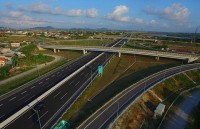
The rise of Vietnam’s App economy
Latest
| TIN LIÊN QUAN | |
| Vietnam’s economy accelerates in third quarter as GDP expands 7.46% | |
| Vietnamese economy continues to perform well | |
 |
| Vietnam has made great strides in the adoption of new technologies by expanding the digital and app economies. (Nguồn: VOV) |
Chief economic strategist at the Progressive Policy Institute (PPI) Dr Michael Mandel said, “When Apple introduced the iPhone in 2007 that initiated a profound and transformative new economic innovation. While central bankers and national leaders struggled with a deep financial crisis and stagnation, the fervent demand for iPhones and the wave of smartphones that followed, was a rare force for growth.”
Vietnam fosters a nascent tech sector, which includes mobile app development, and the country is home to a diverse app economy, encompassing several domains of industry. Digital technologies have emerged as an important export and a catalyst for growth in the Vietnamese economy, with high-tech products contributing 28.7% to Vietnam’s GDP in 2013.
According to the World Bank (WB), Vietnam exported US$38.7 billion worth of high-tech products in 2015, a near tenfold rise on the figures in 2010. Come 2020, it is estimated that high-tech products and applications will account for 45% of Vietnam’s GDP.
Over the past decade, Vietnam has taken important steps to realise technological innovation in its digital economy. The Strategy for Science and Technology Development for 2011-2020 prioritizes the development of information and communications technology; including computing platforms for PCs, tablets, and mobile devices, a range of biotechnologies, novel materials, and in machine manufacturing and automation.
In addition, the strategy calls for greater investment in research and development and incentivises technological upgrades in the private sector.
However, more can be done to improve the regulatory framework governing high-tech enterprises in Vietnam. The draft Law on Cybersecurity required foreign providers of telecommunications and Internet services to apply for operator licenses, establish a representative office in Vietnam, and host on a server that stores Vietnamese users’ data in the territory of Vietnam.
According to the paper published by PPI, “these regulations raise the cost of doing business in Vietnam — stifling foreign investment and slowing growth as businesses gravitate to more attractive opportunities. In particular, the expansion of the export-oriented app economy will slow if it becomes more difficult for data to cross the Vietnamese border.”
As high-tech industry sees a rapid expansion, a shortfall in the supply of necessarily skilled workers has emerged. According to the online employment agency VietnamWorks, between 2012 and 2015, the number of jobs in the IT sector increased by an average of 47% each year, while the number of employees grew by only 8%. The app economy is particularly starved for skilled workers with computer science training.
Projections suggest that Vietnam could face an annual labour shortage of 78,000 in the IT sector and lack one million IT workers by 2020.
Since coming to market in 2007, the iPhone, by allowing third-party applications, has led to the development of a global app economy which has in turn supplied an important source of jobs and economic growth for Vietnam. PPI estimates that the number of people employed in Vietnam’s app economy stood at 42,500 as of December 2017.
This includes core app economy jobs, indirect app economy jobs, and a conservative estimate of spill over jobs. App economy jobs span sectors across the economy, ranging from technology to finance and beyond.
There has been great progress in Vietnam as item braces the challenge of developing a digital economy to meet the global demand for high-tech products.
As part of its efforts, the Strategy for Science and Technology Development for 2011-2020 focuses on the development of information and communications technology, recommending the design of new operating systems for devices.
However, in the environment of the fourth industrial revolution more steps can and should be taken to facilitate the next generation of app development, such as ensuring a looser regulatory framework and enabling the workforce with digital skills to close the skills gap.
 | Vietnam, from sewer to buyer In the past few years, Vietnam’s economy seems to have positive prospect with the increase of income level. This has shifted the demand of Vietnamese ... |
 | Vietnam looks to private sector to fund infrastructure A need to fund infrastructure projects vital to expanding Vietnam’s economy and boosting connectivity is pushing its government to turn to the private sector for ... |

























